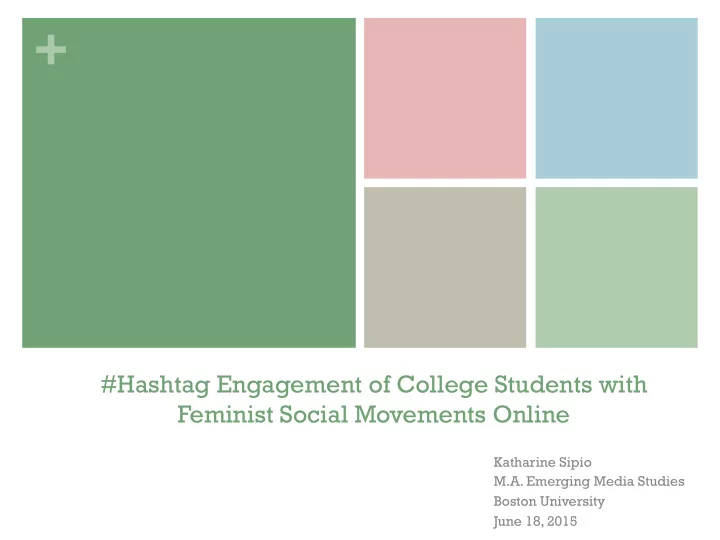

+ #Hashtag Engagement of College Students with Feminist Social Movements Online Katharine Sipio M.A. Emerging Media Studies Boston University June 18, 2015
+ Research Question(s) 1. How do college students engage with hashtags on Twitter? Is their hashtag use impacted by social movements and activism online, specifically in regards to feminism? 2. How are feminist issues being discussed as larger narratives on Twitter? • Hypothesis: There is a disconnect between these discussions and the reach they are having on younger audiences and their participation through hashtags.
+ Literature Review n College students are more digitally active than any previous generation (Kohut et al., 2007). n Hashtags help users contribute to discussions of existing topics, and to find previous conversations about them (Huang et al., 2010). n Networked Feminism describes a new and emerging phenomenon of women using the Internet as a platform to fight against sexism (Fotopoulou, 2014). n Users maintain collective power through the use of narratives, hashtags, and identity, and has resulted in hashtag feminism emerging as something that is becoming recognized globally (Dixon, 2014, p. 34).
+ Method n Mixed-methods n Survey n Social media n Hashtag use n Recognition of feminist hashtags n Ideas about feminism and gender equality n Content Analysis n Feminist hashtags #YesAllWomen and #HeForShe on Twitter n Overall sentiment of larger conversations about feminism from the public taking place on Twitter
+ Survey n March 2015 – Pretest n April 2015 – May 2015 n Combined study with other researchers n 235 surveys completed; 218 after data cleaning n Undergraduate students in an introductory communications course n Ages of 18-21; 61% freshmen n 82% female; 18% male
+ Survey Results n Twitter n 72% of respondents had Twitter accounts n Only 10% of respondents stated they used Twitter most often n Average of 1-300 followers n Frequency of use was less than one hour per day n Hashtags n Instagram (58% ) v. Twitter (35%) n Patterns of Usage: Humor/Irony and “I do not use hashtags.” n Twitter: Humor/Irony and Events/Trends n Feminism Online n 51% of respondents thought that feminists could effectively use social media to promote their message n 33% of respondents identified themselves as feminists
+ Patterns of Hashtag Use on Twitter Finding: Social/Political Movements did not surface as a top use of hashtags on Twitter in this sample Self-promotion Brands/Products Emotional Expression/Commentary Social/Political Movements Entertainment I do not use hashtags Events/Trends Humor/Irony 0 10 20 30 40 50 60 70 80 90
+ Feminist Hashtags Most recognized: #Bringbackourgirls (115) • Least recognized: #1ReasonWhy (149) • Most used: #YesAllWomen (10) and #HeForShe (10) • Least used: #WhyIStayed (106) • 160 140 120 100 80 Recognized Not Recognized 60 Used Not Used 40 20 0
+ #YesAllWomen & #HeForShe Finding: More recognition than actual use of these hashtags. 120 100 80 #YesAllWomen 60 #HeForShe 40 20 0 Recognized Not Recognized Used Not Used
+ Content Analysis: #YesAllWomen & #HeForShe n Collection Timeframe: March – May 2015 n Raw data: 14, 537 tweets collected from public data collected using Twitter’s Streaming API via the Twitter Collection Analysis ToolKit (TCAT). n 11,677 distinct users n Dataset Analyzed: 4,000 random tweets n Exported to DiscoverText via Microsoft Excel (.csv) n Coding n Codes: Positive, Negative, Not relevant n 3 coders (80% intercoder reliability) n 1,000 tweets manually coded; 3,000 tweets machine coded
+ Content Analysis: #YesAllWomen & #HeForShe Finding: Significant spike in usage on March 8 for International Women’s Day (#IWD), and another spike in mid- April for Equal Pay Day (#EqualPayDay, #78Cents).
+ Content Analysis Manual coding of tweets à More positive (617) Tweet Examples: Positive: “Watching @EmWatson Q&A best thing i could have watched absolutely inspirational #HeForShe #EqualityMatters.” Negative: “# HeForShe seriously? Have you even been to their website. It has nothing to do with equality.”
+ Limitations n Survey n Findings not generalizable n Not a random sample n Self-reported Data n Content Analysis n Difficulty with capturing and analyzing sentiment n General codes used n Limited to 3 coders
+ Implications n Twitter and its influence with younger audiences online via hashtags? n Recognition ≠ Use n 45% did not use hashtags for trending conversations on Twitter n 64% had not recently used a hashtag associated with a social movement. n Twitter and Instagram preferred SNSs to use hashtags associated with Social/Political movements n 58% think that Twitter is the best SNS to promote social justice and change. n 51% think that feminists could use social media effectively to promote their message
+ Implications n Education and open discussions n Survey responses: n “Social media can be used to effectively promote anything. I follow many feminists on twitter and it helps me understand concepts better. I also follow people who are not feminists , so I am hearing all sorts of opinions.” n “I appreciate positive campaigns such as Dove love your body or Venus "and" messages. I think using social media can help change negative perceptions of feminists as irrational or anti-man when used to promote messages that empower women rather than highlight their “oppression."
+ Future Research n Expand the scope of the analysis beyond college students use of hashtags as a way to participate with feminism. n Gender studies and hashtag use n 52% thought women used social media more frequently n 42% indicated that both men and women have equal influence on social media n 39% of respondents said that most of the time they could tell a person’s gender based on the hashtags they use n 48% agreed , "I can learn a lot about a person's character and values based on the tweets and hashtags they use” n Analyze hashtag use + compare online and offline activity n Conduct a longer time analysis of additional feminist hashtags
+ Thank You Katharine Willa Sipio kwsipio@gmail.com
Recommend
More recommend